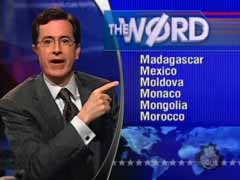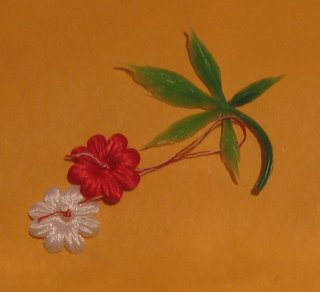"Spring is here, la la la. Spring is here.
Life is skittles and life is beer.
I think the loveliest time of the year is the spring.
I do.
Don't you?
'Course you do."
- Tom Lehrer
Today ends my nearly three weeks of non-spring writer's block. Plenty of things have happened: we English teachers had an environmental conference, my parents visited from America (guest blog entries coming soon), and I returned to teaching after a short vacation.
But none of these events seemed worth writing about because it was still snowing. In the States, where we think of March 21st or 22nd as the first day of spring, snow this late wouldn't be bothersome. But in a country where the supposed first day of spring is March 1st, an extra three weeks of cold weather saps the spirit.
Today, temperatures in Moldova topped 50Вє F for the first time in at least four months. The sun was shining brightly, and not a single cloud sullied the blue sky. I taught wearing only one layer of clothes. Kids went outside during class breaks, and when they came in, they were sweaty and unfocused and wanted to go back outside as quickly as they could; it was perfect.
As an official goodbye to winter, I'm presenting a play-by-play account of a rutiera ride to and from Hincesti that I attempted on Friday, March 3rd. A package was waiting for me at the post office in Hincesti, and because I would be busy and not in my raion for most of the next week, this was the only suitable day for me to pick it up. There was the slight challenge of time, since I needed to be at the school for a lesson at 10:10, but if I left my house at 8 a.m., it wouldn't be a problem.
7:50 I enter the kitchen and great my host mother, Maria.
"I didn't think you'd go to Hincesti today," she says.
"Why not?" I ask. "You thought I'd sleep in?"
"Well, there's that," Maria says. "But there's so much snow on the roads."
"The rutiere will be working, right?"
"Yeah, you'll be fine."
"Great."
I eat my breakfast, put my boots on, and head out.
8:05 I open our gate and step outside. I'm greeted by a foot of snow, easily. Not a good sign. But then again, the conditions are rarely good to walk nearly a mile on dirt roads. I roll up my jeans and start high-stepping down the road through the snow-drifts.
8:15 After working up a good sweat just getting to the paved road that runs through the center of our village, I arrive and see a van waiting on the side of the road. Several men and I climb into the van, and the driver puts the van in reverse to get back on the road. There's just one problem; we're stuck in the snow on the side of the road.
The women wait in the bus while we men get out and start pushing.
8:18 Still pushing. I look up and down the road. If Moldova had mountains instead of hills, this road would be excellent for skiing. But as the main artery for all traffic from southwestern Moldova to Chisinau, the road is not helped by the three inches of soft, wet snow and the layer of ice underneath. Two of my seventh graders, Eugen and Ilie, see me pushing the van and approach.
"Oh, hello, Mr. Peter!" they say.
"Hi, boys," I respond. "How are you?"
"I'm fine," both boys say in unison. "And you?
"I'm good."
"Va duceti la Hincesti?"
"Da."
"Dar, facem lectie astazi?" Ilie asks, wondering if I'll be back in time for class. I tell them I'll be back in time. They want to help, so they run to get some sand from a neighbor's so that the van's tires can grip the road better. Before they can return, the van has gotten on the road and we're off.
8:25 After a handful of minutes on the road, I have seen a good amount of damage brought about by the snow. Over the course of three kilometers, we pass a half-dozen cars, rutiere and trucks stuck in the snow. Our van spins out once, ending up perpendicular to the road. It's like a sled ride, except if you spin out when there's oncoming traffic, you can die.
8:26 Our van turns off the main road while we're still only half-way to Hincesti. The van stops at a gate, and the driver tells us that this is as far as he's going today. Six of us get out of the car (I didn't pay) and begin walking toward Hincesti. The road is slippery, and I concentrate to keep my legs under me.
8:30 A car stops to pick us up. However, this is no ordinary car. This is a Land Rover. I share the back seat with two other men, there's another man in the passenger seat, and the driver opens the rear door so that two women can sit in the cargo area on the collapsable seats; there are large grain bags in the cargo area that double as comfortable footrests.
8:40 We cruise into Hincesti with the power of four-wheel drive, and the driver doesn't even want money. I go to the post office and pay my three lei (25 cents) tariff on my package.
8:50 I leave the post office and call another volunteer who was planning on meeting me in Hincesti that morning. The only problem is that her bus never left her village. Well, that's one less fun thing to do in Hincesti, which I believe brings the total back down to zero.
8:55 I walk to the school supply store and buy a Romanian dictionary. Yes, I already have an English-Romanian dictionary, but this dictionary goes into detail about agreements for every noun and adjective and conjugations for every verb. Very useful. Later, I discover that it doesn't even have colors. Okay, so less useful than I thought. Oh well, it only cost about four bucks.
9:05 I leave the store and walk back to the post office to wait at the corner for a rutiera. When I arrive, I see my host uncle, Gheorghe, also waiting. After we shake hands and exchange greetings, he tells me that the rutiera that normally goes to our village and its neighboring village, Sarata Galbena, is here, but the driver doesn't want to drive in this weather. Let me explain that transport doesn't come too often, especially in a blizzard, and I need to be in my classroom in an hour. This is not the opportune time for a driver to desert his post.
9:10 An old friend of Gheorghe's comes by. I don't catch his name, but I notice his black jacket with "Paza Paramilitara" written across the back. As far as I know, this is an Italian police jacket, and I have no idea why this particular Moldovan would be wearing it. Gheorghe tells our paramilitary specialist that the driver doesn't want to leave. Paramilitary Man says he'll take care of it, and he walks toward the rutiere.
9:15 Paramilitary Man has achieved success. Another driver, Vasile, will take us. We and some other Moldovans fill up the van and head off down the road.
9:20 Paramilitary Man is standing in the front of the rutiera. I'm sitting with Gheorghe and three other men in the back. I've met one of them before, a man named Alex who lives in Sarata Galbena and hosted a volunteer there for a year. He's the first one to start making jokes. I don't understand them all, but the gist is how awful Moldovan president Vladimir Voronin is and how short Russian president Vladimir Putin is. I laugh when the others laugh.
9:30 After completing two-thirds of our trip in much more time than it usually takes, we come to a traffic jam. One truck has run off the road, and that's just the first problem. Further ahead, there are about 40 cars trying to get through a pass on this small two-way road. Once again, it's the men's job to get out and push. Alex, the man from Sarata Galbena, conducts traffic like a pro, telling people which car to push and when and giving constant words of encouragement in both Romanian and Russian. To complete the mental picture, yes, he's wearing one of those furry Russian hats. At one point, he slips and falls; if only I could remember the string of Russian profanity he let loose.
9:40 A truck comes down the road, spreading sand as it passes. With the cars finally able to gain some traction, the situation returns to normal and we're driving again. I have 30 minutes to get to the school.
9:50 We arrive in Mereseni. I get off and tell Gheorghe that even though I would normally walk with him, I'm in a hurry. I high-step back home.
10:00 I get to my house. I still need to pack my books for the day. I go inside and take off my boots, but I still track snow through the house because of what has stuck to my pants.
10:03 I leave the house. Seven minutes left.
10:07 After running most of the way to school, I have taken off my hat and opened my jacket for the final 100 feet. As I approach the front steps of the school, a gust of wind blows, and snow falls off the branches of a nearby tree onto my head. Thanks for the finishing touch, God.
10:08 I arrive at the school. Doamna Maria, my school director, takes one look at me and asks me what happened. I give her the short story. She tells me that if I don't go home and change my wet pants, I'll get a cold. Rather than explain that bacteria and viruses cause illnesses, not wet pants, I tell her that I don't have time.
"You're going to catch cold," she says. "Then your mom is going to come and say that I'm to blame."
I reassure her that I won't get sick, and leave to prepare my classroom for the day.
10:10 The bell to end second period rings. My 7a class comes into my room and tells me that there is a school assembly. They go down to the assembly, which lasts 20 minutes. For most of those 20 minutes, I sit in my room and wonder why I hurried to get to school.
So with that winter adventure over, I can now look forward to spring.






